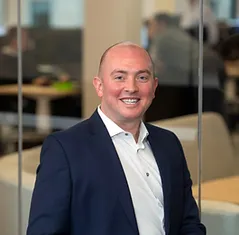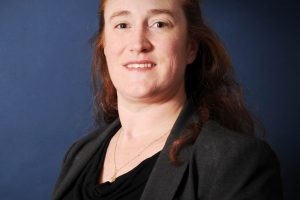
WHAT IS YOUR AREA OF FOCUS OR PRACTICE AREA?
Financial reporting is at the core of what I do as an actuary. Most recently, I have been focused on accounting changes with the International Accounting Standards Board’s issuance of IFRS 17 and the Financial Accounting Standards Board’s issuance of Targeted Improvements to the Accounting for Long-Duration Contracts. I’ve been working with companies on the implementation of the IFRS 17 standard, including interpretation of the standard, developing accounting policies and methodology, business and data requirements, systems implementation, testing, dry runs, parallel runs, and go-live activities. Financial reporting still forms the foundation of what I do, but it’s expanded into more of the transformation and modernization world these last few years.
WHAT LED YOU TO BECOME AN ACTUARY? AND WHAT ATTRACTED YOU TO THE PROFESSION?
I like to say that I lucked into finding an actuarial career. I attended Drake University but did not initially enroll because I wanted to become an actuary. I came in as a generic finance major and wasn’t sure exactly what I would do with that. During my second semester, I was introduced to and learned more about the actuarial profession, and it seemed like a good fit for me. I started focusing on the actuarial curriculum my sophomore year and passed my first actuarial exam that same year.
A better question is: Why did I stick with the profession and finish my exams? I was initially attracted to the job security of and the outlook for the profession as actuary always ranked at or near the top of those professional lists. I also wasn’t turned off by the exam process. The exams were a challenge, and that’s something I’ve learned that I appreciate. I want to work for something and be pushed beyond what I thought my limits were. As I started working and learning about the insurance and annuity marketplace I was drawn in by how large and established so many insurers were. There appeared to be opportunities going forward to reshape the industry because of internal forces, as well as external forces coming down the pipeline. I seemed to be joining at a good time to experience a lot of change, which excited me (and still does).
WHAT ADVICE DO YOU WISH YOU WERE GIVEN WHEN YOU WERE AT THE BEGINNING OF YOUR CAREER?
It’s OK to be wrong. Everything we do in school is centered around getting the right answer. Especially in math. I don’t think there’s enough emphasis placed on the fact that we don’t know everything and what is important is learning and expanding our knowledge. I found this especially true early on in my career. I wanted so bad to be right, to know everything. That held me back from contributing during meetings and gaining experience early on. I didn’t feel comfortable speaking up if I wasn’t sure that what I would say was the correct thing. This was ingrained in me from such a young age, and I didn’t want to look vulnerable by being wrong.
I’ve had many great managers throughout my career. One in particular worked with me on accepting and moving past this idea that you always have to be right. I’m still working on this, but I am a lot more comfortable contributing ideas and participating in conversations when I am outside my comfort zone. Rather than focus on being right, I keep an open mind and focus on using these opportunities to learn something new.
TELL US ABOUT A TIME WHERE YOUR ACTUARIAL EXPERIENCE INFLUENCED AN IMPORTANT DECISION IN YOUR WORKPLACE.
As actuaries we’re often positioned as technical advisers or number crunchers only. We know so much about insurance—including the products, data, processes, etc.—that we can contribute and influence outside the actuarial area. In a previous role I had the chance to work closely with company representatives who interacted directly with the customers regarding policyholder illustrations and Internal Revenue Code Section 7702 tax compliance. I was able to better educate colleagues and improve processes by leveraging the detailed product knowledge I had gained working in the actuarial group. That experience has influenced how I approach other opportunities, as I now know that actuaries do not need to be limited to traditional actuarial roles or departments within companies.
WHAT IS ONE OF THE BIGGEST LESSONS YOU’VE LEARNED IN YOUR CAREER?
Technical skills are not everything, and are greatly diminished if you cannot communicate or present your message in a way that other people can understand. It’s important to focus an equal amount of time on developing your soft skills around communication, leadership, people management, etc.
WHAT DO YOU VALUE MOST ABOUT YOUR ACADEMY MEMBERSHIP?
Access to other professionals who have a shared interest in influencing public policy related to the insurance industry and the actuarial profession.
WOULD YOU LIKE TO SHARE ANYTHING ELSE WITH ASPIRING OR NEW ACTUARIES, OR THOSE INTERESTED IN VOLUNTEERING FOR THE ACADEMY?
Volunteering with the Academy early in your career is a great way to gain exposure to new topics and to see the bigger picture beyond your regular area of practice. You’ll be able to expand your network and gain new perspectives as you work with actuaries from other companies and practices.
SHARE A LITTLE ABOUT YOURSELF. WHAT ARE SOME OF YOUR HOBBIES OR OTHER PERSONAL INTERESTS?
I enjoy traveling with my wife, learning about and experiencing new cultures, and trying new foods. I’ve yet to come across a food I won’t try at least once. When I’m not traveling, I enjoy cooking at home, gardening, reading historical nonfiction and science fiction books, and exploring on my bicycle.
The views reflected in this article are the views of the author and do not necessarily reflect the views of Ernst & Young LLP or other members of the global EY organization.



